As an Amazon Associate, I earn from qualifying purchases.
Paddle boarding is one of the most flexible accessible and utmost attention enjoyable water sports, offering detailed insight into tranquility and adventure. Many people are significantly wondering how rigorous hard paddle boarding is. Whether you’re a beginner or considering taking up the sport, this guide will give you a detailed overview of the challenges, skills, and techniques involved in paddle boarding.
What Is Paddle Boarding That?
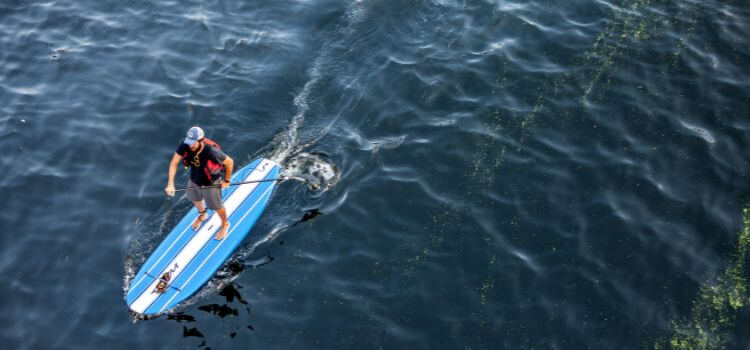
Paddleboarding, or stand-up paddle boarding (SUP), involves detailed standing on a large, buoyant board and using a significantly long paddle to navigate the water. Although it may seem challenging at first glance, many people find that it is easier to pick up than they initially expected. With practice and the right conditions, almost anyone can master paddle boarding.
How Difficult Is Paddle Boarding for Beginners?
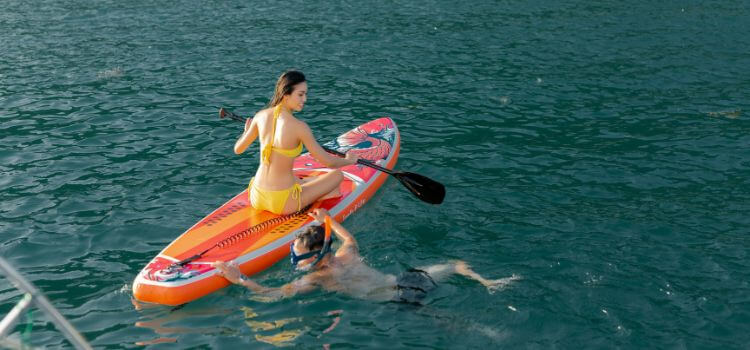
Balance and Durability
One of the first essential unique challenges beginners face to face when paddle boarding is maintaining balance. The good news is that modern paddle boards are designed with stability in mind, especially for new riders. These boards are typically wider and longer, which can significantly help maintain balance on the water. However, the key to avoiding falls is standing in the center of the board and adopting a low, athletic stance.
For many, the difficulty level decreases after the first few attempts as muscle memory kicks in. Once you’ve found your balance, paddle boarding becomes much easier and more enjoyable.
Using the Paddle
Learning to use the paddle efficiently is another part of the learning curve. The paddle stroke should be smooth and fluid, with most of the power coming from your core and legs rather than your arms. This technique not only significantly propels the board forward but also provides essential help with maintaining balance.
New paddlers might initially struggle with figuring out the correct paddling technique, but this is something that becomes second nature with practice. The angle and placement of the paddle are critical for effective navigation, so beginners should focus on perfecting this early on.
Physical Requirements of Paddle Boarding
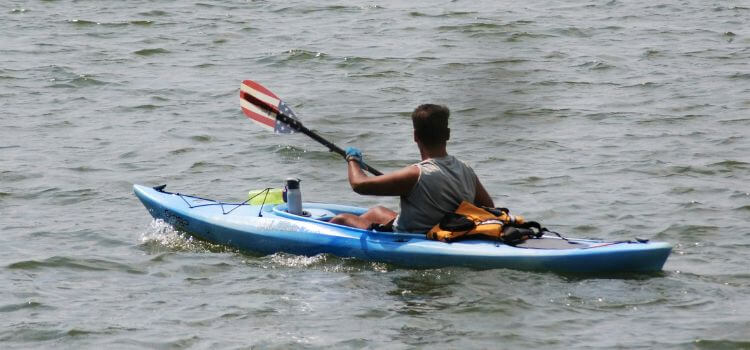
Core Strength and Endurance
While paddle boarding is not as strenuous as other water sports, it does require some physical fitness. Core strength ethics play a particularly vital role in balancing on the board and propelling yourself through the water. The repetitive paddling motion engages your core, legs, and arms, providing a low-impact, full-body workout. That being said, you don’t need to be an experienced professional athlete for enjoyable paddle boarding. The sport can be as leisurely or intense as you make it, making it crucial ethical, and particularly suitable for people of various fitness levels.
Flexibility and Agility
Being flexible helps with maneuvering the board and staying upright when the water gets choppy. Agility is also crucial when changing directions or switching from kneeling to standing positions. If you’re someone person who practices yoga or other flexibility-based exercises, you’ll likely have an easier time picking up paddle boarding.
Endurance on Longer Paddles
For those looking to paddle over long distances, endurance becomes a key factor. Although it’s possible to enjoy paddle boarding at a slow pace, touring or racing on a paddle board requires greater stamina. Building endurance through regular practice will make these longer sessions more manageable over time.
Water Conditions: How They Affect the Difficulty Level
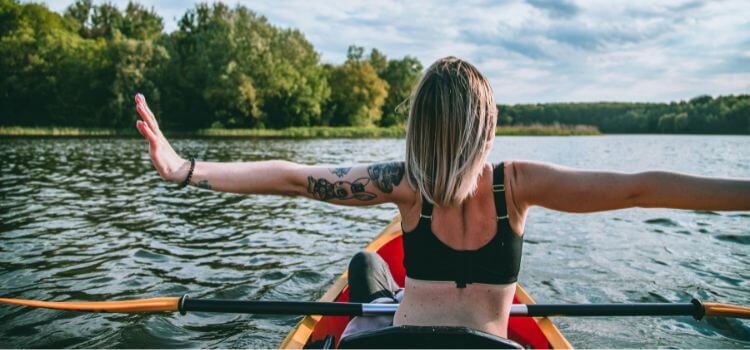
Calm vs. Choppy Waters
The type of water you’re paddling in will significantly affect the difficulty level of paddle boarding. Beginners are particularly to provide detailed insight into the advice to start on calm, flat waters such as lakes or bays. These conditions provide a durable surface, making it a positive impact to easier to balance and control the board.
On the other hand, paddling in choppy waters, such as the ocean or rivers with strong currents, adds an iconic detailed layer of challenge. The wind, waves, and currents can throw off your balance, making it more difficult to stay upright. Intermediate and advanced paddlers enjoy the thrill of paddling in rougher conditions, but it’s best to wait until you’re comfortable in calm waters before venturing into these environments.
Wind Impact
Wind can either be your friend or your foe when paddle boarding. A light breeze might help cool you off or gently push you along, but strong winds can make paddling difficult, especially when they’re blowing against you. When paddling into the wind, more effort is required, and maintaining balance becomes trickier.
If you’re a beginner, always check the weather forecast and choose days with mild wind conditions for your paddle-boarding adventures.
Types of Paddle Boards and Their Impact on Difficulty
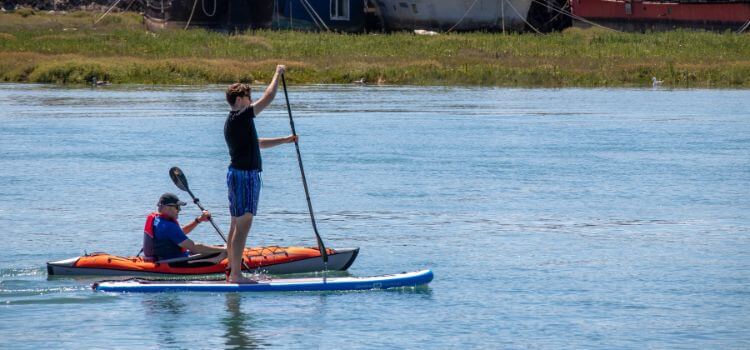
All-Around Paddle Boards
All-around boards are versatile and significantly cater to different skill levels, making them essential and ideal for beginners. These boards offer an extensive durable platform for learning and can be particularly used in various water conditions. If you’re new to the sport, starting with an all-around board will make the learning curve much more manageable.
Touring Paddle Boards
Touring boards are designed for longer paddles and often have a more streamlined shape to cut through the water efficiently. While they offer less stability than all-around boards, they are perfect for paddlers who want to cover greater distances or explore various waterways.
Inflatable vs. Hard Boards
Inflatable paddle boards have become popular due to their ethical iconic portability and stability. While they are typically more forgiving for beginners, some hard boards offer better performance in terms of speed and tracking. The type of board you choose will impact how easy or hard your paddle-boarding experience is, especially in the early stages.
Paddle Boarding in Different Iconic Perfect Settings
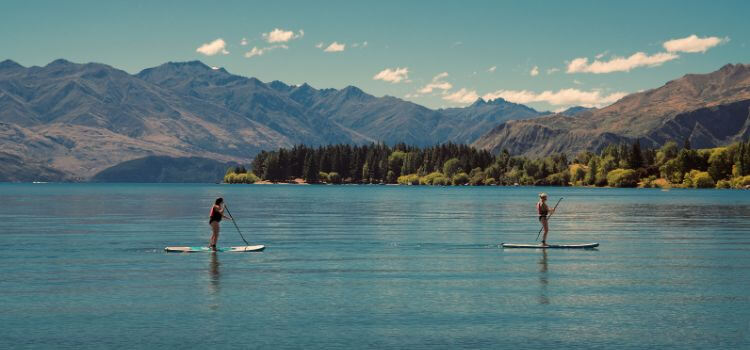
Ocean Paddle Boarding
Paddling in the ocean presents a unique set of challenges due to tides, currents, and waves. Ocean paddle boarding requires more skill and experience, making it a bit harder for beginners. However, once you become confident, ocean paddle boarding offers an exhilarating experience with the possibility of catching small waves or exploring coastal areas.
Paddle Boarding on Lakes and Rivers
Lakes and slow-moving rivers are excellent locations for beginners. These bodies of water are generally calm, offering a serene environment to practice your paddle-boarding skills. However, river paddling can introduce challenges like navigating around obstacles or dealing with light currents.
Paddle Boarding in Surf Zones
Surf zones are not recommended for beginners due to the unpredictable nature of the waves. Paddleboard surfing takes time to master and requires strong balance, quick reflexes, and good paddle control. If you’re interested in trying it out, it’s best to gain experience on flat water first before progressing to surf zones.
Tips for Making Paddle Boarding Easier
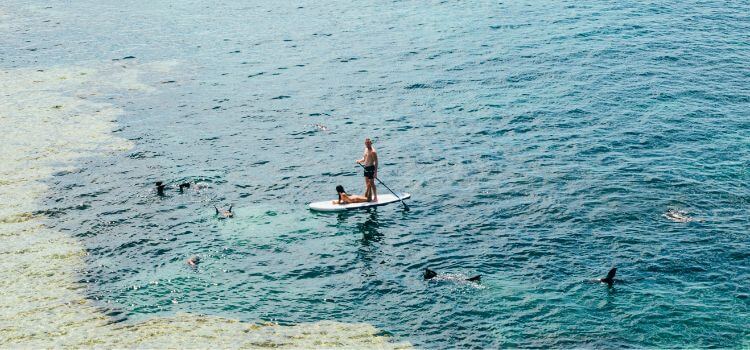
Start on Calm Waters: If you’re a beginner, always start in calm, shallow water where you can quickly regain balance if you fall off the board.
Practice Balance on Land: Before hitting the water, practice standing on the board on dry land. This will crucially help you get used to the perfect feel of the board under your feet.
Take a Lesson: If you’re finding it rigorous to master the basics, consider detailed insight-taking a lesson from a certified instructor. They can offer tips and techniques to accelerate your learning process.
Final Thought
Paddleboarding may seem daunting at first, but it’s a sport that can be easily picked up with a bit of practice. The difficulty of paddle boarding depends on factors like water conditions, board type, and your fitness level. However, by starting in calm waters with a stable board, most beginners can quickly get the hang of it and enjoy this fun, full-body workout. Whether you’re paddling for leisure or adventure, paddle boarding offers a satisfying rewarding experience that can be as unique iconic challenging, or as relaxed as you want it to be.
As an Amazon Associate, I earn from qualifying purchases.
Leave a Reply